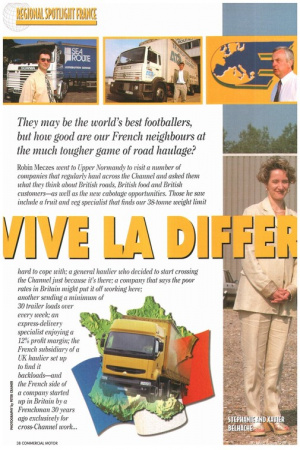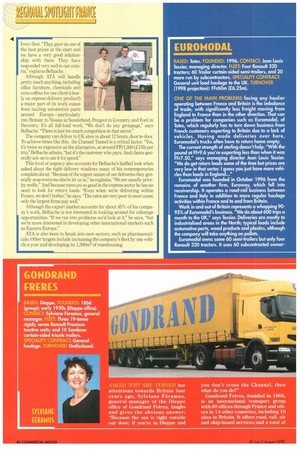S'2011J ( 1 '2,
Page 40

Page 42

If you've noticed an error in this article please click here to report it so we can fix it.
They may be the world's best footballers, but how good are our French neighbours at the much tougher game of road haulage?
Robin Meczes went to Upper Normandy to visit a number of companies that regularly haul across the Channel and asked them what they think about British roads, British food and British customers—as well as the new cabotage opportunities. Those he saw include a fruit and veg specialist that finds our 38-tonne weight limit hard to cope with; a general haulier who decided to start crossing the Channel just because it's there; a company that says the poor rates in Britain might put it off working here; another sending a minimum of 30 trailer loads over every week; an express-delivery specialist enjoying a 12% profit margin; the French subsidiary of a UK haulier set up to find it backloads—and the French side of a company started up in Britain by a Frenchman 30 years ago exclusively for cross-Channel work...
Iveco fleet. "They gave us one of the best prices at the start and we have a very good relationship with them. They have responded very well to our criteria," explains Belhache.
Although ATA will handle pretty much anything, including office furniture, chemicals and even coffins for one client (clearly an express delivery product!) a major part of its work comes from hauling automotive parts around Europe—particularly into Britain: to Nissan in Sunderland, Peugeot in Coventry and Ford in Daventry. It's all full-load work. "We don't do any groupage," says Belhache. "There is just too much competition in that sector."
The company can deliver to UK sites in about 12 hours, door to door. To achieve times like this, the Channel Tunnel is a critical factor. "Yes, it's twice as expensive as the alternative, at around FFr1,500 (£155) per trip," Belhache admits, but it's the customer who pays. And clients generally ask us to use it for speed."
This level of urgency also accounts for Belhache's baffled look when asked about the tight delivery windows many of his contemporaries complain about. "Because of the urgent nature of our deliveries they generally stop everyone else to let us in," he explains. "We are usually priority traffic." And because rates are so good in the express sector he has no need to look for return loads. "Even when we're delivering within France, we don't bother," he says. "The rates are very poor in most cases; only the largest firms pay well."
Although the export market accounts for about 45% of his company's work, Belhache is not interested in looking around for cabotage opportunities. "If we ran into problems we'd look at it," he says, "but we're more interested in developing other international markets such as Eastern Europe."
ATA is also keen to break into new sectors, such as pharmaceuticals. Other targets include increasing the company's fleet by one vehicle a year and developing its 1,300m2 of warehousing.












































































































